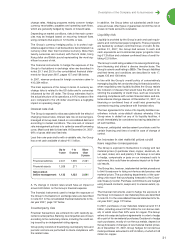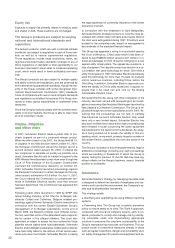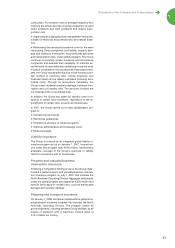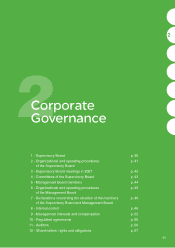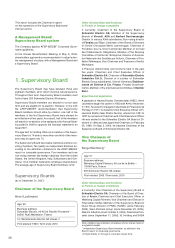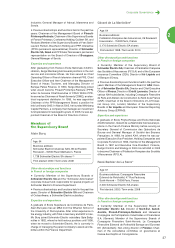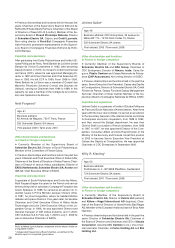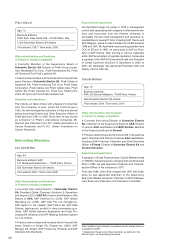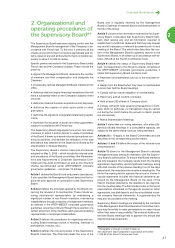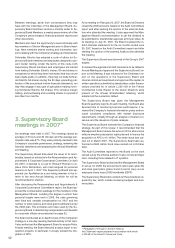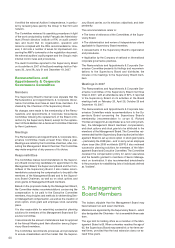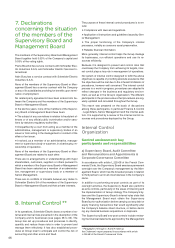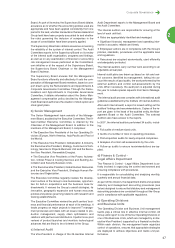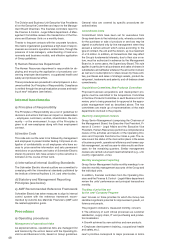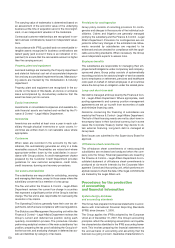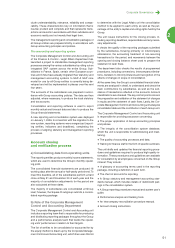APC 2007 Annual Report Download - page 43
Download and view the complete annual report
Please find page 43 of the 2007 APC annual report below. You can navigate through the pages in the report by either clicking on the pages listed below, or by using the keyword search tool below to find specific information within the annual report.
41
Corporate Governance
2
2. Organizational and
operating procedures of
the Supervisory Board**
The Supervisory Board exercises ongoing control over the
Management Board’s management of the Company, in ac-
cordance with French law. To this end, it performs all the
checks and controls that it considers appropriate and ob-
tains copies of any and all documents that it considers nec-
essary to allow it to fulfill its duties.
Specific powers are vested in the Supervisory Board under
French law and the Company’s bylaws. These include the
power to:
Appoint the Management Board, determine the number
of members and their compensation and designate the
Chairman.
If necessary, remove Management Board members from
office.
Authorize debt and equity financing transactions that will
have a substantial effect on the Company’s balance sheet
structure.
Authorize material business acquisitions and disposals.
Authorize the creation of stock option plans or stock
grant plans.
Authorize the signature of regulated related party agree-
ments.
Authorize the issuance of bonds and other guarantees,
subject to compliance with French law.
The Supervisory Board may appoint one or two non-voting
members to assist it and/or decide to create Committees
of the Board. It draws up internal rules and procedures cov-
ering its activities, and decides the allocation of the total
attendance fees awarded to the Supervisory Board by the
shareholders in General Meeting.
The Supervisory Board’s internal rules and procedures
adopted on May 3, 2006 – which include the internal rules
and procedures of the Board committees (the Remunera-
tions and Appointments & Corporate Governance Com-
mittee and the Audit Committee) as well as the directors'
charter recommended under AFEP-MEDEF corporate
governance guidelines – comprises 13 articles:
Article 1 defines the Board's role and powers (see above).
It also specifies the Management Board decisions that re-
quire the prior approval or consultation of the Supervisory
Board.
Article 2 defines the principles applied by the Board con-
cerning the renewal of its membership. These include as-
suring international representation by maintaining a
significant number of non-French members, maintaining
independence through a majority of independent members
as defined in the AFEP-MEDEF corporate governance
guidelines, ensuring continuity through the re-election of a
certain proportion of the members each year and enabling
representation of employee shareholders.
Article 3 defines the procedures for organizing and con-
ducting Board meetings (notice of meeting, methods of
participation, minutes, etc.).
Article 4 defines the role and powers of the Supervisory
Board’s Chairman. The Chairman leads the work of the
Board and is regularly informed by the Management
Board’s Chairman of material events and developments in
the life of the Group.
Article 5 concerns the information received by the Super-
visory Board. It stipulates that Supervisory Board mem-
bers shall receive any and all information required to
enable them to fulfill their duties and that they may request
any and all necessary or relevant documents prior to any
meeting of the Board. The article also describes the con-
tent of the Management Board’s quarterly reports to the
Supervisory Board, to be drawn up in accordance with ar-
ticle L.225-68 of the French Commercial Code.
Article 6 defines the status of Supervisory Board mem-
bers. Corresponding to the director’s charter contained in
the AFEP-MEDEF corporate governance guidelines, it
states that Supervisory Board members must:
Represent all shareholders and act in the corporate in-
terest.
Resign from the Board when they have not participated
in more than half the Board meetings.
Comply with an overall obligation of confidentiality.
Report any and all conflicts of interest.
Hold at least 250 shares of Company stock.
Comply with strict rules governing transactions in Com-
pany stock (in particular, no transactions may be carried
out during the month before the annual or interim results
are announced).
Attend Shareholders' Meetings.
Article 7 states that non-voting members, who attend Su-
pervisory Board meetings in a consultative capacity, are
subject to the same ethical rules as voting members.
Articles 8 to 10 apply to the Board Committees and are
described in the corresponding section below.
Articles 11 and 13 define the scope of the internal rules
and procedures.
Article 12 allows for the Management Board to allocate
management tasks among its members, with the Supervi-
sory Board’s authorization. To ensure that Board members
are fully prepared, the Company sends them the meeting
agenda ten days before upcoming Board meetings, along
with draft minutes of the previous meeting. Four to five days
beforehand, the members also receive a meeting file. The
file for the meeting held to approve the annual or interim fi-
nancial statements includes the financial statements ap-
proved by the Management Board (in the case of the
interim financial statements, the deadline is two days be-
fore the meeting date). The file includes notes or the text of
presentations scheduled on the agenda, as well as, when
appropriate, any draft reports and the consolidated or par-
ent company financial statements. A supplementary file
may also be provided at the meeting.
Supervisory Board meetings are attended by the members
of the Management Board and Executive Committee mem-
bers may be invited to make presentations on major issues
within their area of responsibility. The external Auditors at-
tend the Board meetings held to approve the annual and
interim financial statements.
**Paragraphs 2 through 4, 8 and 9 make up
the Chairman’s report prepared in accordance with article
L.225-68 of the French Commercial Code.


